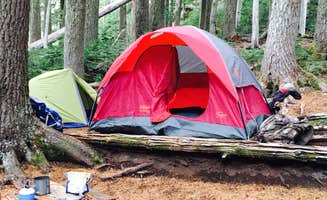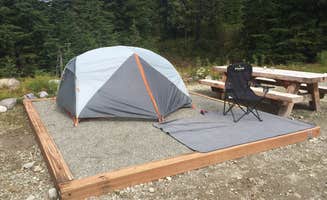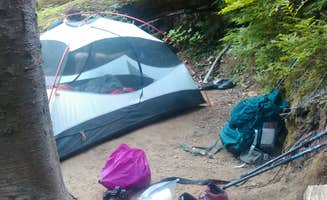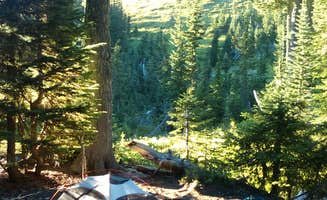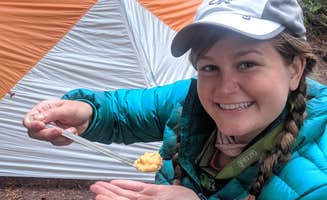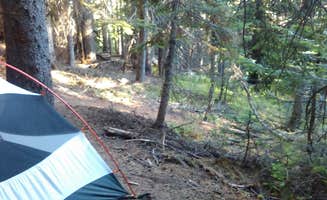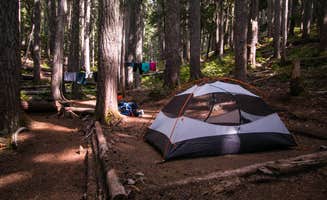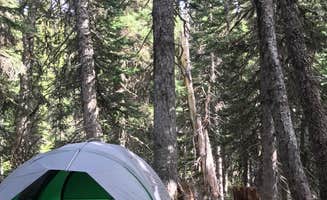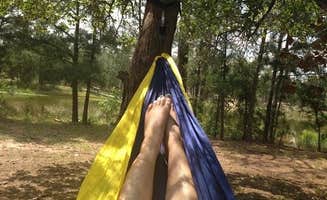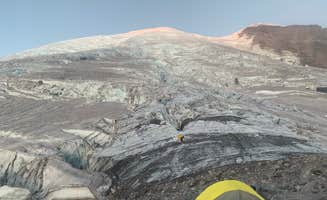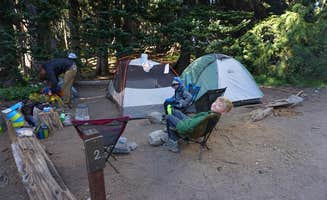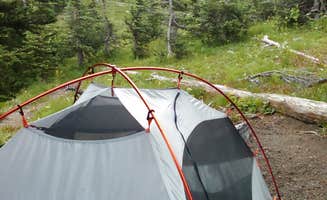Tent campsites near South Prairie, Washington range from basic backcountry sites to walk-in facilities with minimal amenities. Most sites sit between 2,000-5,000 feet elevation, with snow possible into July at higher locations. Visitors should prepare for temperature drops to the low 40s Fahrenheit overnight, even during summer months.
What to do
Mountain lake swimming opportunities: At Mowich Lake Campground, the crystal clear, turquoise water provides a refreshing spot to cool off after hiking. "The lake is this amazingly clear, turquoise blue. You can see the fallen dead wood sitting at the bottom of the lake," notes Maria P.
Suspension bridge exploration: The Carbon River area features remarkable bridge crossings. "If you are coming from one direction, you cross a really awesome suspension bridge. We crossed it the next day, but if you didn't cross it on your way, go take a look, it's one of the best suspension bridges I have been on," shares Danielle S. about Carbon River Camp.
Alpine wildflower viewing: Spring and early summer hiking routes showcase colorful blooms. "My favorite time of year to do this hike is in the spring time because there are so many gorgeous flowers that are blooming. I almost feel like I am in some sort of flower painting," describes Julie P. about trails near Granite Creek.
What campers like
Secluded riverside spots: White River Dispersed Camping offers primitive sites along the water. "The second night, I managed to find a spot tucked super far in that had a small private beach. It was farther from the road so you couldn't see or hear anything. I didn't see anyone else the whole afternoon/night," reports Corbanzo B.
Wildlife encounters: Early mornings often bring deer and other animals through camp. "We weren't really at the campground much of the day because we were out exploring and hiking," mentions Skylar M., highlighting how Ipsut Creek Backcountry Campground serves mainly as a base for wildlife viewing during daytime explorations.
Hammock-friendly sites: Some locations feature ideal tree spacing for hammock camping. "While there are tons of trees all around, if you are hammock camping you are actually a little limited. You could make 1 hammock work at most of the sites, but we had 2 and we were very glad we arrived at an empty campground and had our pick. We chose site 4 and made it work," advises Kier S. about Eagles Roost Camp.
What you should know
Fire restriction variations: Regulations differ between locations. "We also hiked Spray Fall which was gorgeous. Mowich Lake is close by and the water is so clear and beautiful! Definitely nice to have the lake close by to jump in on a hot day," notes Adeline T., mentioning that despite the water proximity, fires aren't permitted at many sites.
Bear management requirements: All backcountry sites enforce proper food storage. "There are several bear poles around the site, so unless you are in site 7 your food and stinky stuff are close by," explains a camper about site arrangements at Eagles Roost Camp.
National Park pass considerations: A pass or entrance fee covers multiple days. "We have an America Beautiful pass which I highly recommend because it pays off quickly. We were actually able to use that pass for the campground so it only costed $5 a night. Steal of a deal," shares Adeline T. about using passes efficiently.
Tips for camping with families
Arrival timing strategies: For sites without reservations, midweek visits improve chances of securing space. "We got there at like 3pm on a Tuesday and got one of the last 2 spots, it definitely fills up fast even during the week," warns Megan H. about Mowich Lake's popularity even on weekdays.
Temperature preparation: Pack extra warm layers regardless of season. "Even in July there is snow and temperatures reached as low as 40F. Fortunately we were prepared, but you may not be," cautions kasey at Mowich Lake, emphasizing the need for cold-weather gear even in summer.
Trail connectivity: Choose sites with direct trail access for shorter adventures with children. "Great trails right from site," notes Laura F., describing how Paradise Pines and similar locations allow families to access nature without driving between activities.
Tips from RVers
Road condition awareness: Many campground access roads feature gravel or rough sections. "The road gets a bit worse as you drive further, but it was manageable. A little road noise but it's drowned out by the sound of the creek," explains Reagan S. about White River Dispersed Camping's access conditions.
Parking limitations: Most tent sites separate parking from camping areas. "You will have to carry your gear up you cannot park next to your site," clarifies Laura F. about Mowich Lake, noting the walk-in nature of many tent sites around Mount Rainier.
Clearance requirements: Low-clearance vehicles may struggle on some access roads. "The road can be a bit thin, so I would be careful with extra large vehicles. It is also a bit of a challenging road, so low clearance vehicles wouldn't be treated well," advises P.J. about White River Dispersed Camping's approach.


